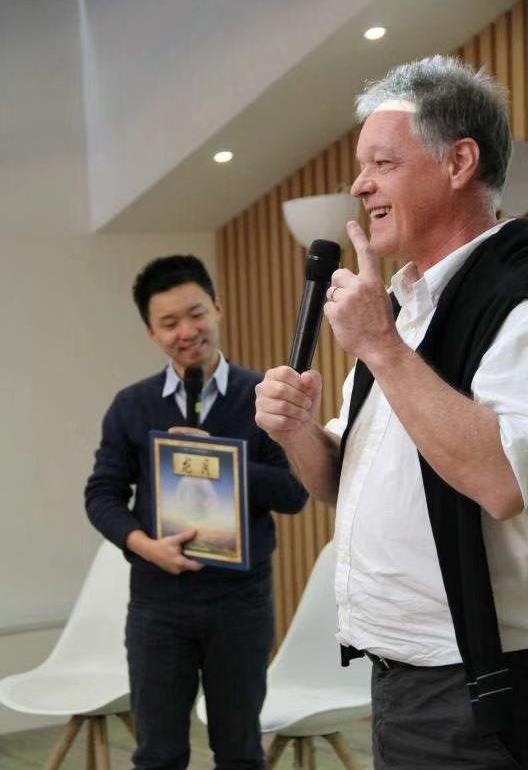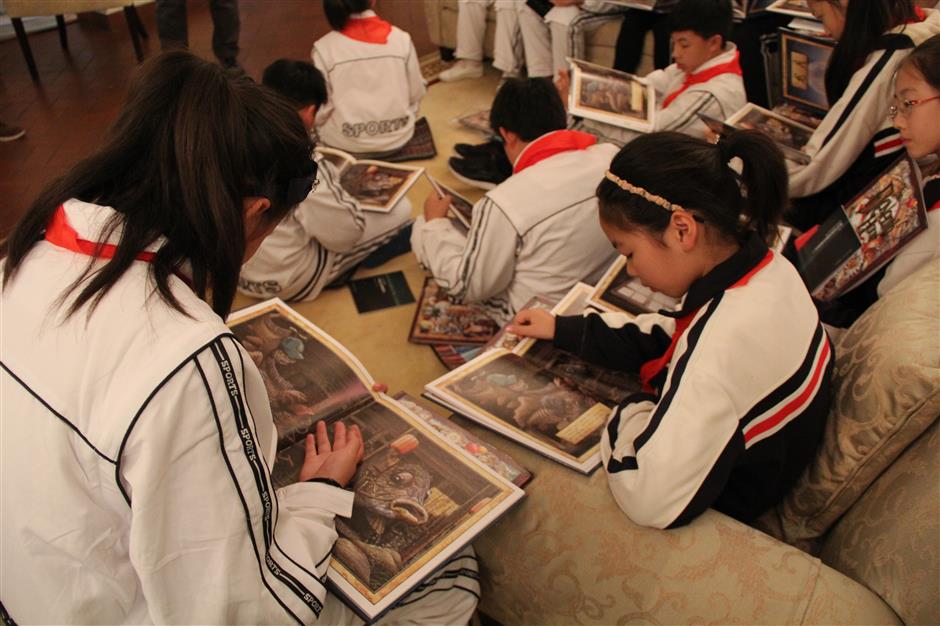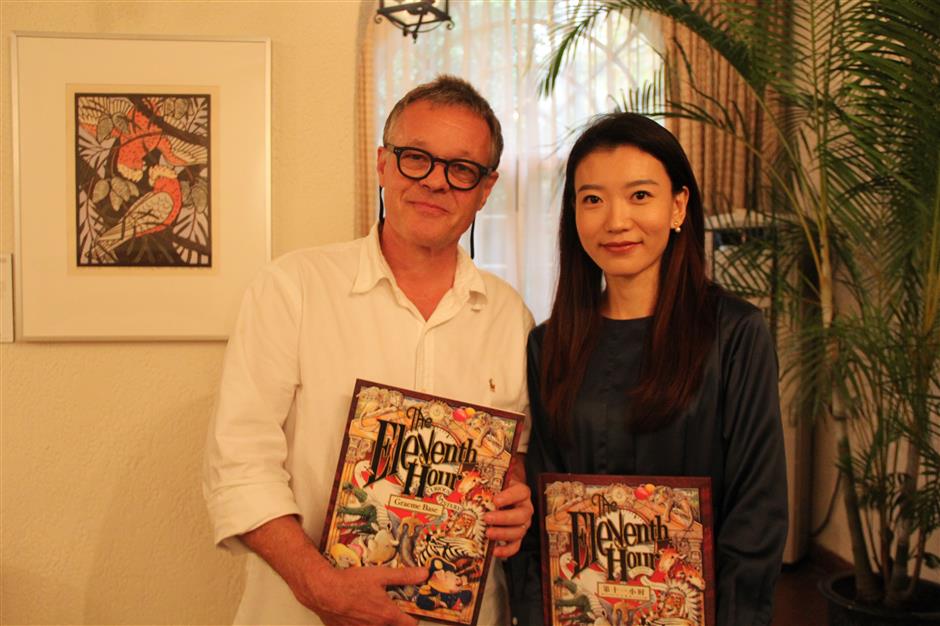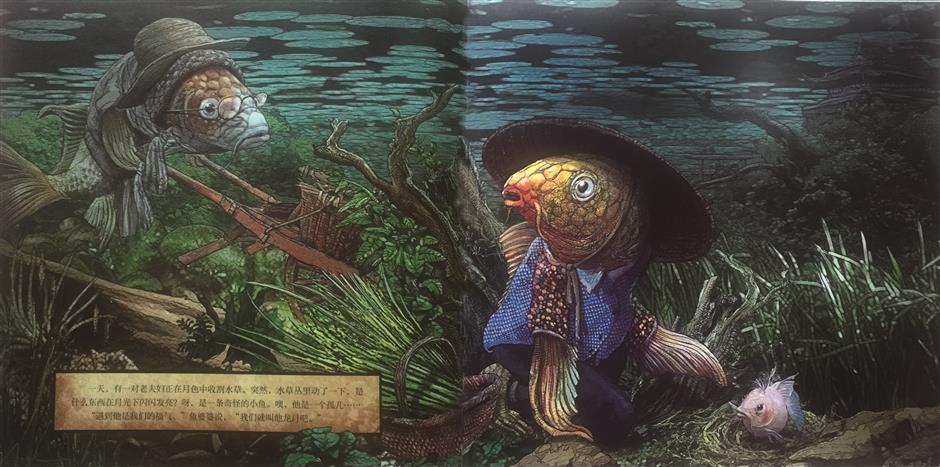Aussie artist imagines a panda fish in his latest children's book

Australian artist Graeme Base talks about his new book "Dragon Moon" as his translator and Chinese co-author Chen Ying looks on.
When Graeme Base visited China for the first time eight years ago, the wildly imaginative children’s writer and illustrator had little idea that he would be reading a dragon story to two dozens Chinese children.
Children from two primary schools in Shanghai were the first readers of the newly published “Dragon Moon” by the Australian artist who is best known for his bestsellers “Animalia” (1986) and “The Eleventh Hour” (1989).
The book, named after its main character, is the dragon version of the classic Ugly Duckling tale which nicely fits into the Chinese imagery of a fish leaping over the dragon gate to become a dragon — a term commonly used today to mean someone has become better and stronger.
“I have to travel to be inspired. And the best way to be inspired is to be somewhere new,” Base tells Shanghai Daily.
The Australian is on his fourth trip to China. On this book tour he will be covering 10 cities. “Dragon Moon” was published in Chinese first, and he is now working on the English edition.
In “Dragon Moon,” Base put in a lot of details in his illustrations that were largely inspired by his previous trips to China. Many pages in the book have a distinct landscape and culture that impressed him in Beijing, Inner Mongolia Autonomous Region, Jade Dragon Snow Mountain in Yunnan Province and other places.
He loves the pandas so much that he created a special panda fish in the story that is set in the water. The panda fish is on every page of the book — on some pages he is easy to find and on other pages intriguingly hidden.
After all, this is the illustrator who hid a picture of himself as a child in “Animalia” and Morse Code, musical notes and encrypted verses in “The Eleventh Hour.” For the second one, he created a whodunnit kind of mystery — like who has eaten all the food for the elephant’s 11th birthday party?
“In all my books, I love hiding things,” he says. “I like the idea of the book being read once, and the reader enjoying it in the simple way, and then goes back and discovers new things.”
He says he likes to challenge children because they are very curious and inquisitive.
“I never try to talk down to children. If anything, talk slightly over their heads and they will leap to the occasion,” he says.

Children from two primary schools in Shanghai are the first readers of the newly published “Dragon Moon.”

Graeme Base poses with Tong Hua, translator of "The Eleventh Hour."
The climax of “Dragon Moon” is literally a big leap — when he transforms into a dragon and leaps out of the water. Base created the idea that was welcomed by his Chinese editors — coincidentally, it is a famous imagery in Chinese culture.
“In the Western culture, dragons are evil and you battle against them,” he says. “I love the idea of the dragon in China being a positive influence.”
The image of the dragon was hardly the only cultural difference he discovered while traveling with his Chinese editors working closely on the book.
“It is a great danger from somebody coming into a culture and trying to write a book about that culture to some extent,” he says.
“I was very aware that you can make terrible mistakes by coming into a country and think that you know how to tell a story about that country. That would be arrogant. It was important for me to take a step back, not to be precious about my story, but to allow others to become involved in it.”
He gave some examples of his editors’ and co-author's notes.
For one, when Dragon Moon is teased by other children in the village. He is depressed. Instead of leaving in anger as Base initially envisioned, in the book he talks to his parents and decides that “for myself, I need to find out who I am in the world, and leave with the blessing of my parents.”
Base explains: “I learnt that it is important culturally for a child not just to leave, but to talk to the parents and get their understandings and blessings.”
The 59-year-old artist is also confident the cultural references, while adding familiarity to Chinese readers, will also add intrigue for kids elsewhere.
“The story is universal,” he says. “It is of belonging, of self-discovery and coming to value the meaning of home — not where you were born or live, but where you heart lies, where you have that belonging. Sometimes it takes a leap of faith or bravery to go out in the world in order to come home.”

Graeme Base's new illustration book "Dragon Moon"
















